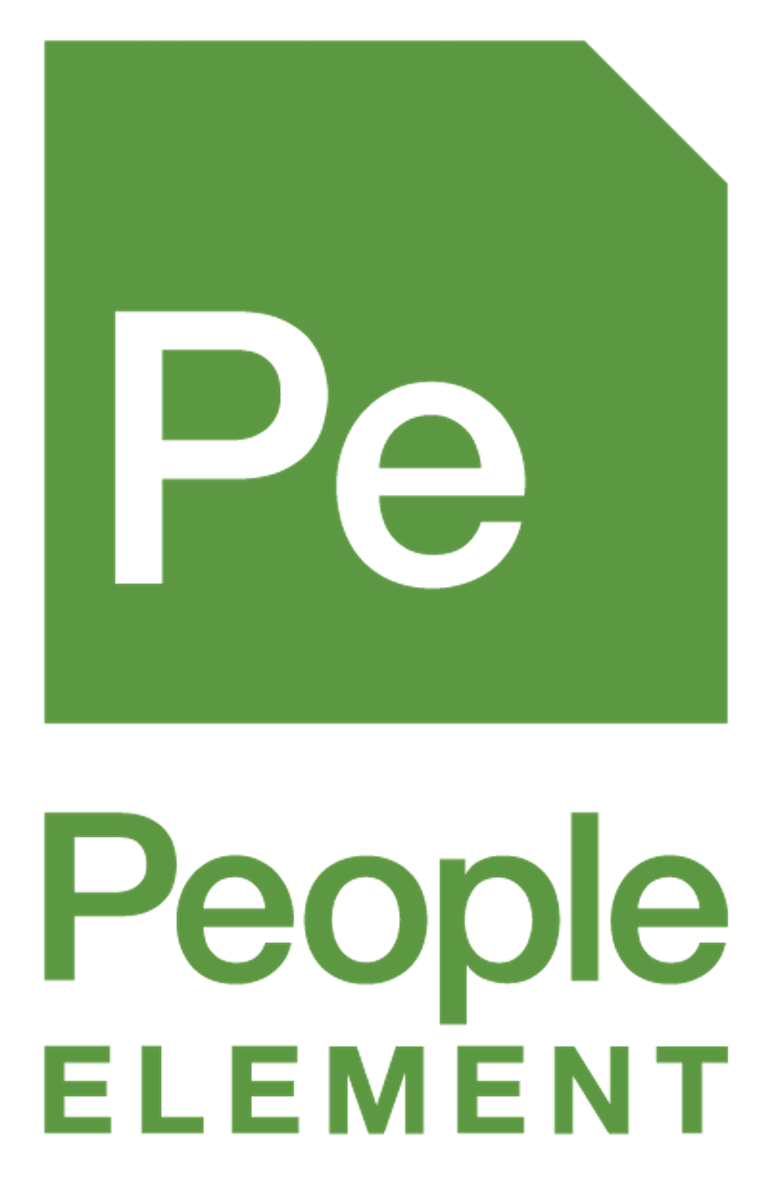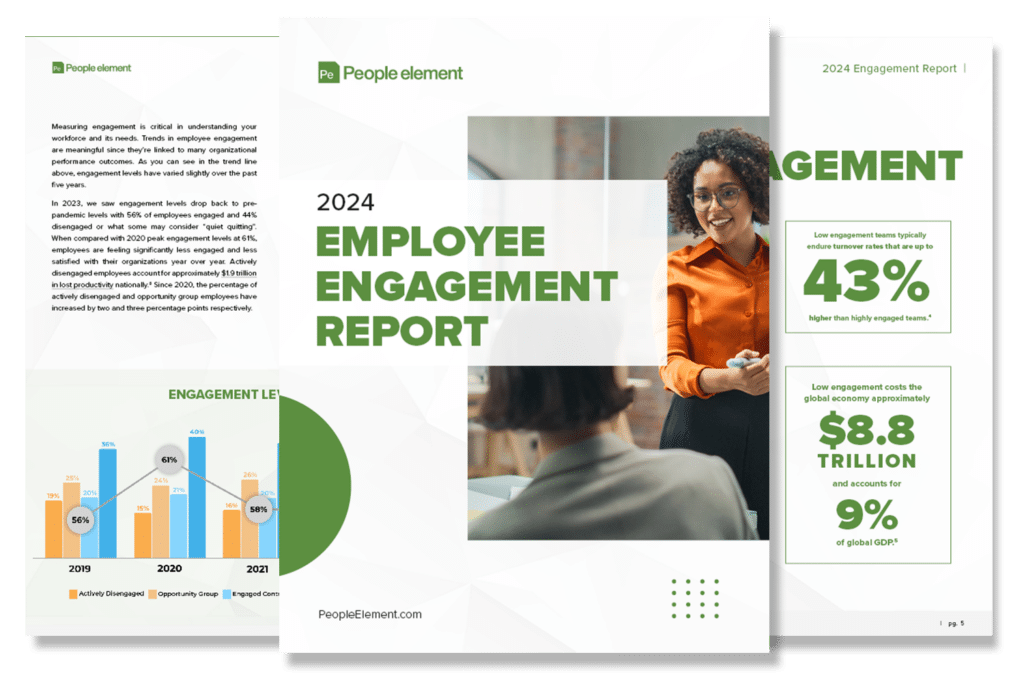People Element sits down for a conversation with the Director of People Engagement at Forward Air to discuss their success through Employee Feedback Surveys.
People Element is focused on helping organizations listen to, engage, inspire, and understand their employees. We’ve been helping organizations collect and take action on employee feedback giving employees a voice, companies actionable insights, and the confidence to act to improve their workplace.
We recently held a Client Spotlight event and below is an excerpt of a conversation with Matt Gentry, the Director of People Engagement for Forward Air. He shares some best practices and how they have been supporting their employees and gaining insights through employee feedback with the help of People Element.
Main takeaways:
- Employee listening is vital, especially now during the ‘war on talent’
- Employee experience and personal relationships within the team often outweigh monetary compensation and benefits.
- Manager feedback from employees is often overlooked but when nurtured can become a game changer.
- Getting feedback isn’t enough – taking action and making changes is crucial to getting results.
Tom Horne: Thanks for joining us today, Matt, please tell us a little bit about Forward Air.
Matt Gentry: Forward Air is a full-service shipping and logistics organization. We have a diverse workforce made up of our drivers who keep materials moving from place to place, our terminal workers and cargo handlers who make sure that everything moves across our docks safely. We also have all our support teams that make sure that the operations run smoothly. All-in-all, we have roughly 4,500 employees and 3,000 independent contractors.
TH: What’s the best part of your job at Forward Air?
MG: This is going to sound very cliché, but my title is Director of People Engagement. I think I’d be remiss if I said anything other than the people. The reality is, when we started doing our surveys through People Element, one of the things we found was that our people felt the same way. There was a question on a survey, which asked everyone if their coworkers made them feel welcome. That question across the board has always been our highest scoring question and category.
I found that very thing to be true in my own experience. My favorite thing about Forward Air is exactly how welcoming, and friendly everybody is. You think about trucking, shipping, and logistics and you don’t always think about people being exceptionally personable. It’s just not what comes to mind. But that really changed for me when I joined Forward Air and I realized what fantastic people we have within our organization.
TH: Thinking about the last two years at Forward Air, what have been the biggest challenges facing your workforce?
MG: I mentioned the dynamic nature of our work environment. Probably two thirds of our employees are out in the field. They’re either driving trucks or they’re moving freight across our docks. The other third are in support roles. Across the board, the one thing that has been a consistent challenge is the war for talent.
People have more opportunities than ever, especially for our field team. It doesn’t take a lot for someone to be lured away. Sometimes just the difference of 50 cents or a dollar an hour in pay could be enough during this time to have somebody switch jobs. When everyone is facing record inflation, we are staying competitive in our total rewards package. Those things have been a challenge. But what we discovered is money isn’t everything.
“…it’s not just about the monetary compensation, or just about the benefits that we offer people, it’s also about their experience with us and trying to drive and develop that emotional connection.”
The need to connect with our employees has been one of the reasons why People Element has been a big part of our strategy. We are continually looking for ways to connect, whether it’s somebody out in the field or somebody in a support role within our offices. It has been a challenge and the one thing that we’ve really been trying to tackle since I came on board.
TH: The last couple of years have been challenging due to COVID. I am sure you feel these pressures. What are some of the impacts on your business, as a result of those challenges?
MG: Obviously time and attendance has been down. It’s a unique environment we’ve been operating in. With COVID, working on a dock and being around other people has led to unique challenges. People have been needing to take time off, so our responsiveness to that has been incredibly important. Making sure that we make time for people to be able to get vaccinated, and time for people to take off from work if they need it. One of the things that I feel has really changed is we, as an organization, have had to do a much better job of listening.
Not that we shouldn’t be doing a great job of that all the time, but just given the pressures of the last two years that we’re facing, and given the war for talent, I feel that we have done a fantastic job of listening. We are hearing from our people is: understand what it is that we need to feel safe to come to work, and what it is that we need to be able to perform at our best.
TH: What have executives at Forward Air done with this data you have been gleaning? How are you acting on it?
MG: Well, not to give too big of a plug to People Element here, but you have been a huge help. Our engagement survey has been one of our most important tools. We have made sure that we have open-ended questions there for people to be able to give their open and honest feedback, in a confidential and anonymous environment. People Element helped us with our survey design, and it has been a big help.
Kyle Mitchin, our Chief People Officer, is fantastic. One of the reasons that I joined the team was his commitment to people. Every time he or another executive go to a city we serve, they make sure that they spend time out on the docks. They stop and they talk to our employees.
Our dock appreciation week creates great opportunities for us to engage. Also, we recently had our first town hall as an organization. These have been a primary way we are collecting data and hearing from our people.
TH: What’s one of the best success stories since giving that voice to your team? Is there anything that really stands out and has made a difference for Forward Air?
MG: One of the main things we have heard is that the relationship with an employee’s manager is probably the most important thing that impacts day-to-day happiness. Engagement is a word that gets thrown around a lot, and we tend to start thinking of engagement in terms of surveys, retention, and the outcomes from it.
“At its core, engagement is about the emotional connection that people have to their company, the emotional connection that people have to their teams, to their work, and with their manager.”
Thinking about who employees interact with the most daily, the manager to employee relationship piece is important. What we have heard and learned from our surveys is that people really felt like there was a big opportunity to improve that relationship and emotional connection with their managers, especially out in the field. They wanted to feel like they were being heard. They wanted to feel like their manager was interested in their career growth and development. And they also wanted to feel like they were getting better feedback from their manager.
So, we got that message loud and clear. One of our biggest opportunities was to improve that relationship, that engagement and connection with their manager. What we were able to do, and honest to God, there is really no way we would have been able to do it without our support person, Megan at People Element. We were able to take the data from our engagement survey, using the People Element platform, and turn that data into an Upward Feedback Scorecard.
A manager would get their scorecard, and they could then say, “Okay, here’s an area where I can improve, and here’s some training that I can take that will help me to work on that.” For our managers who received some of the most difficult feedback from their employees, we had one-on-one conversations with each of them. We wanted to help them understand their scorecard, what it means, and help them to find a positive way to move forward. It was important for those managers to know it isn’t a “you get a bad score and you’re kicked out” environment, but really an opportunity to learn, develop, and improve by receiving direct feedback from their employees. As an organization we want to ensure our managers feel that we believe in them, support them, and are willing to invest to develop them.
Without the data, we would not have been able to give them these insights they could use to improve. So far, our managers are loving it. We are getting ready to do another Upward Feedback Scorecard here in March. We’ll be using the same 15 questions so managers who’ve been working hard will be able to find out how they have improved based on the activities or actions they’ve taken. They can see how their score has changed and be able to react to that. Then we will also be developing new and refreshed training so we can better respond to their needs. That has probably been the biggest success story. It’s been a huge team effort, and People Element was a big part of that team for us.
TH: Excellent. One of the biggest items when we talk about employee engagement and doing surveys is that we can get good data. People Element can help simplify that collection and analysis process, but at the end of the day, you must do something with it to make it valuable. When you do that, you can drive meaningful change.
MG: What managers really appreciate is we are thinking about the feedback they are receiving. Oftentimes, managers in organizations are overlooked and they just do not get the feedback they need. And if they do, it tends to be too general, and it isn’t based off data. What we really loved about this new process, and our managers reinforced this, is that they loved that this is real data coming directly from the people on their team.
“This is the first time the managers got specific feedback about themselves in specific areas of their performance. It has really been a game changer for them.”
TH: I love that story. One of the things I liked most about our first conversation that really stuck with me was you were very honest. You were like, “People Element, it’s great. It does this great thing, and it helps us to collect and analyze the data, but our biggest focus as an organization is with the individual employees, and with their managers.” I just want to acknowledge that while our platform does great things, it is all about really listening to and understanding your employees, so you can connect with them on a more personal level. What you have done is a huge accomplishment.
MG: Well, thank you. It’s a big shift! People Element has really helped us uncover these pockets of opportunities to dig into and determine where we are struggling, and what our biggest challenges are. We have been able to take the insights from the data and use them to be more proactive. By taking these steps and helping managers check in with their employees more often, they have been able to have better conversations about their personal growth and development.
Also, what we’re doing now is creating more conversations on the front end. We really want to get to a point using the People Element platform where we are confirming what we are already hearing from our people. By creating more opportunities to engage with our employees, we can start using our surveys for less discovery and more confirmation because we are capturing the voices of our employees through many channels.
TH: Matt, thanks for your time today.
MG: You are welcome, thanks for having me.





